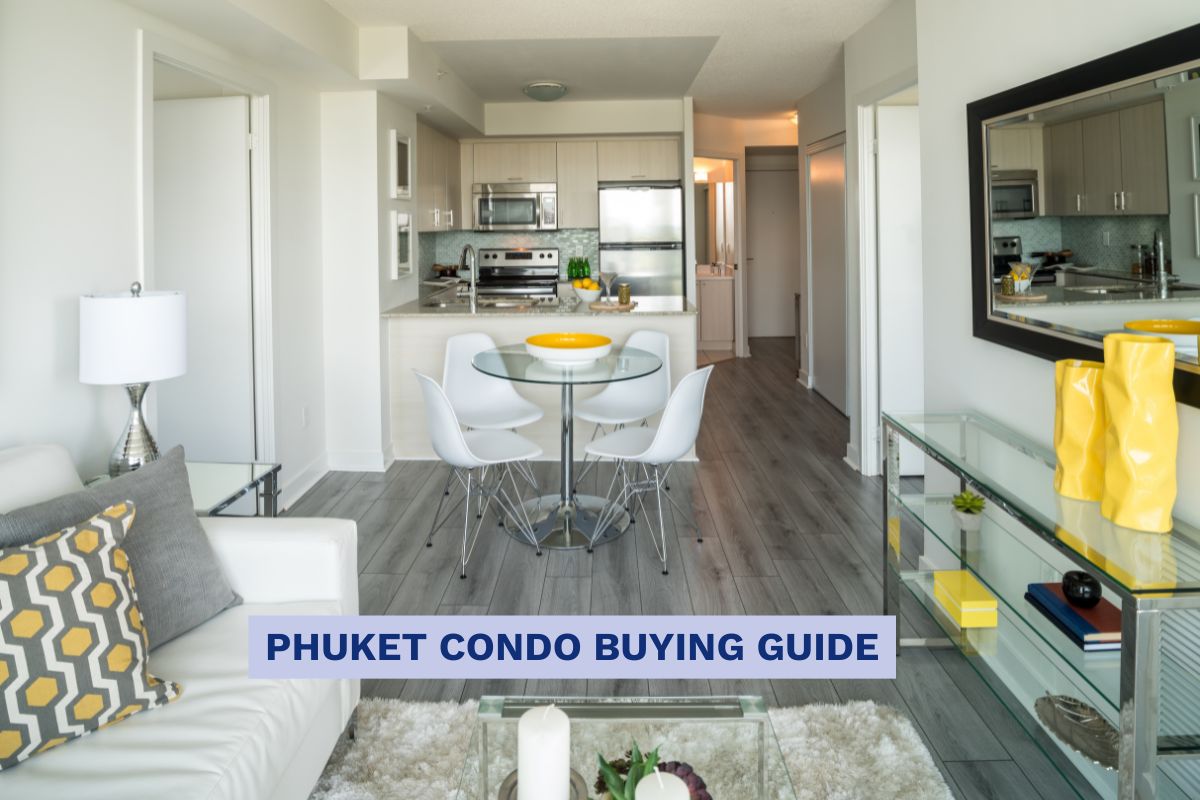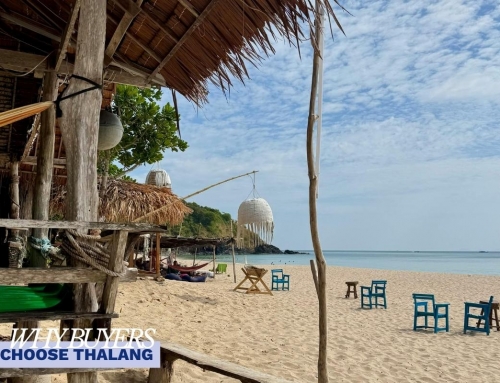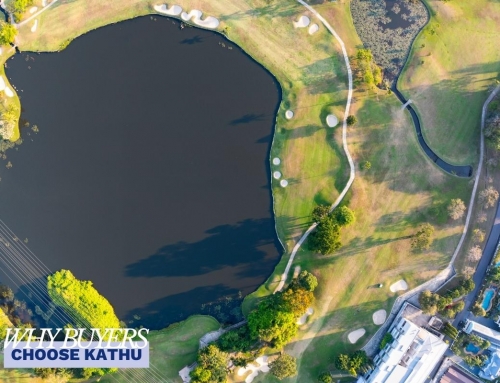Buying a condo in Phuket is one of the easiest and most secure ways for foreigners to own property in Thailand. This Phuket condo buying guide explains how Thailand’s Condominium Act allows non-Thai nationals to legally hold a foreign freehold title in their own name, making condominiums a top choice for both lifestyle and investment.
Phuket combines tropical beauty, modern amenities, and a strong rental market — a combination that attracts buyers from all over the world. Whether you’re looking for a holiday home, a full-time residence, or an income-generating asset, the island’s condominium market offers plenty of opportunities.
See our Phuket condominiums for sale.
Why Condos Are So Popular with Foreign Buyers
Unlike land or villas, which generally require leasehold or company structures, condominiums offer true freehold ownership for foreigners. As outlined in this Phuket condo buying guide, you own your individual unit outright along with a percentage of the building’s common areas, such as pools, gyms, gardens, and reception areas. This ownership is registered at the Land Department and protected under Thai law.
Condos also provide:
-
Low maintenance – the Condominium Juristic Person (CJP) manages the building, common areas, and facilities.
-
Security – most developments have 24-hour guards, CCTV, and controlled access.
-
Resort-style amenities – pools, fitness centres, landscaped gardens, and sometimes on-site restaurants or retail.
-
Strong rental potential – especially in high-demand tourist and expat areas.
A condominium is the only form of true freehold ownership available to foreigners in Thailand.
You may also want to read about all the benefits of buying a condo in Phuket:
The Benefits and Advantages of Buying a Condominium in Phuket
Why Buy a Condominium in Phuket?
For foreigners, this Phuket condo buying guide highlights why a condominium purchase offers the most secure form of property ownership available in Thailand. Unlike land or villas, which generally require leasehold agreements or a minority share in a Thai company, a condominium can be owned outright in your own name.
Ownership is registered at the Land Department and backed by a freehold (Chanote) title, granting permanent ownership rights.
This is made possible under the Thailand Condominium Act (1979), which provides strong legal protections for both Thai and foreign buyers. The Act has been updated over the years to strengthen investor safeguards and ensure market transparency.
Under the law, foreign ownership within a condominium project is limited to 49% of the total unit area, with the remaining 51% reserved for Thai nationals. Importantly, foreign owners enjoy exactly the same legal protections as Thai owners.
Thanks to this legislation, foreigners have been confidently buying condos in Phuket for decades, knowing that once purchased, the property is entirely theirs until they choose to sell.
Why Choose Phuket Over Other Parts of Thailand
Phuket is Thailand’s most sought-after island for property buyers thanks to:
-
World-class beaches and marinas
-
International schools and hospitals
-
Diverse dining and entertainment options
-
Continuous infrastructure upgrades, including an expanded international airport
-
A well-established expat community and transparent property market
These advantages create a stable environment for both personal use and investment, with strong potential for capital appreciation and rental income.
Understanding the Phuket Condo Market
The Phuket property market has shown consistent growth for over two decades, driven by tourism and improved infrastructure. Unlike some markets, it has avoided extreme boom-and-bust cycles, offering steady value appreciation.
Tourism fuels both the economy and rental demand, making condos in prime locations attractive to investors. High-quality developments often come with professional rental management, making it easy for owners to generate passive income.
Is Buying a Condo in Phuket a Good Investment?
For many, yes. Well-located condos can achieve rental yields of 6-9%, with guaranteed return programs sometimes offered for the first few years. Combined with the island’s enduring appeal, this can lead to both income and long-term value growth.
Key factors for a successful investment:
-
Location (proximity to the beach, attractions, or amenities)
-
Developer reputation
-
Quality of facilities and management
-
Legal due diligence
You may also want to read our article on investing in a Phuket condo here:
Phuket Condo Buying Guide: What Will a Phuket Condo Cost?
Prices vary widely:
-
Entry-level inland units: THB 4-5 million
-
Mid-range near the beach: THB 5-12 million
-
Luxury beachfront: THB 20-70+ million
- Super luxury: prices can be over THB 100+ million
Phuket Condo Buying Guide: Additional Costs to Consider
-
Transfer fees & taxes – usually split 50/50 with the seller or developer
-
Foreign freehold upgrade fee – often between THB 150,000-500,000 for new builds
-
Sinking fund – one-time payment for long-term repairs (typically THB 500-700 per sqm)
-
Common area (CAM) fees – ongoing maintenance costs (around THB 50 per sqm per month)
- Legal Fees – can vary depending on the nature of the purchase, but usually between THB 50,000 and 100,000
Risks to Watch Out For
-
Lack of hotel license (if you plan on short-term rentals)
-
Buying off-plan without proper due diligence
-
Poor developer track record
-
Land title issues (“dirty land”)
-
Confusion between leasehold and freehold ownership
The Purchase Process: Step by Step
-
Hire an experienced Phuket property lawyer – for due diligence, title checks, and contract review.
-
Pay a reservation deposit – usually THB 100,000–200,000.
-
Transfer funds from overseas – ensure you obtain a Foreign Exchange Transaction Form (FETF).
-
Sign the Sales & Purchase Agreement – finalise terms, payment schedule, and inclusions.
-
Ownership transfer – handled by your lawyer or developer at the Phuket Land Office.
-
Inheritance planning – ensure your heirs can easily take over ownership.
Best Areas for Buying a Condo in Phuket
As this Phuket condo buying guide explains, the island offers a wide range of locations to suit different lifestyles and investment goals:
-
Bang Tao & Laguna – luxury resorts and strong rental yields
-
Patong – nightlife hub with high short-term rental demand
-
Rawai & Nai Harn – peaceful, family-friendly, and popular with digital nomads
-
Surin & Kamala – upmarket coastal living often with sea views
You can read more about the most popular areas to help you compare. Read more here:
A Comprehensive Guide to the Best Locations to Buy Property in Phuket
Final Thoughts
Whether you’re purchasing for lifestyle or investment, this Phuket condo buying guide shows that owning a condominium here offers a unique mix of security, convenience, and financial potential. With the right guidance, you can secure a property that delivers both enjoyment and returns for years to come.
Contact the Most Trusted Real Estate Advisors in Phuket
Contact the Most Trusted Real Estate Advisors in Phuket
With nearly 25 years of experience in the Phuket property market, our team at Thai Residential provides expert guidance, legal knowledge, and unmatched local insight. Whether you’re at the start of your journey or ready to purchase, our Phuket condo buying guide can help you make the right decision and avoid costly mistakes.
Let us help you find your perfect Phuket condominium – and buy with complete confidence.
Get in Touch | Call Now On: +66 9484 11918
Contact Us Today for expert guidance on buying a condo in Phuket.
Let us help you navigate the Phuket condo market with our expertise and nearly 25 years of experience.





Social Contact